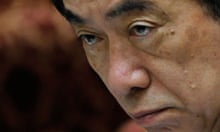The Japanese prime minister, Naoto Kan, has comfortably survived a no-confidence motion after offering to resign as soon as plans for Japan's recovery from the tsunami and nuclear crisis are in place.
MPs in the 480-seat lower house of Japan's parliament voted down the motion on Thursday afternoon by 293 votes to 152.
By offering to quit, possibly in the autumn, Kan has bought himself a few more months in office.
The move will enable him to oversee the operation to stabilise the nuclear plant – which is expected to take several months – and to secure emergency funding for the reconstruction of the country's battered north-east coast.
The fate of Thursday's motion, submitted by the main opposition Liberal Democratic party (LDP) and other opposition parties, was sealed after Kan's main rival in his own Democratic party of Japan (DPJ), Ichiro Ozawa, indicated he would abstain along with 50 of his supporters, having earlier threatened to side with the opposition.
Although he survived the motion, Kan faces a difficult few months, during which he is expected to struggle to reach deals on emergency budgets in a deeply divided parliament, and to introduce a controversial tax rise.
The no-confidence motion has exposed divisions inside his own party, with DPJ executives vowing to take action against rebel MPs who voted with the opposition.
Kan, who has been in office for almost a year, managed to pre-empt his opponents earlier in the day when he pledged to resign once his disaster mission was complete, and suggested it was time the political elite made way for a new generation.
"I would like the younger generation to take over various responsibilities once I have finished fulfilling certain roles as a I work on handling the disaster," he told DPJ MPs.
"The nuclear crisis is ongoing, and I will make my utmost efforts to end the crisis and move forward with post-quake reconstruction work."
His offer to resign convinced his predecessor, Yukio Hatoyama, who also leads a large DPJ faction, to withdraw his support for the no-confidence motion.
Kyodo News reported that Ozawa, a longtime Kan nemesis and notorious power broker, would abstain.
At one stage it had looked possible that opposition parties would come tantalisingly close to securing the votes of the 80 or so governing party MPs they needed to force Kan to resign or call a general election.
Kan, Japan's fifth prime minister since 2006, remained vague about when he would step down. Shizuka Kamei, the leader of a minor partner, said he should resign as soon as the nuclear crisis has been resolved.
Kan's success in buying time to oversee the start of Japan's reconstruction, which could cost up to £113bn, has all but ruined the prospects for a grand coalition comprising the DPJ and the LDP, whose leader, Sadakazu Tanigaki, was behind the no-confidence motion.
"Among possible scenarios the best one would be Kan voluntarily resigning and the DPJ forming a coalition with the LDP to stabilise politics," said Yasuo Yamamoto, senior economist at the Mizuho research institute in Tokyo.
"Unstable politics would weigh on stock prices and delay reconstruction after the disaster.
"From both Japanese and foreign investors' point of view, now is not the time for political turmoil. Japan has various issues it needs to address swiftly – not only reconstruction but also tax and social security reform, TPP [a transpacific free trade agreement] and energy policy, which requires political initiative."
The return to business as usual in Nagatacho, Tokyo's political nerve centre, has been met with anger and disbelief in the country's north-east, where about 100,000 people are still living in evacuation shelters and construction of temporary housing is behind schedule.
The damage to the region's administrative infrastructure would have made it all but impossible for some communities to take part in a general election had the no-confidence motion succeeded.
"We are in a situation of having to delay the prefectural assembly election because elections cannot be held in our prefecture right now," Miyagi prefecture's governor, Yoshihiro Murai, told reporters. "It will be difficult to hold a lower house election, especially in the municipalities along the coast."
An 82-year-old resident of Kamaishi who was living in a local school told the Asahi Shimbun: "Once things become more settled in the region struck by the disaster, they can go ahead and dissolve the lower house as many times as they like. If they dissolve it now, I will abstain from voting."
A day of political turmoil in Japan coincided with a visit by the British business secretary, Vince Cable, who offered British help with the operation to remove waste from the nuclear plant and to decommission its reactors once they have achieved "cold shutdown".
"We can help with strategic planning, technical help with various aspects of decommissioning and waste disposal – we have a lot of experience in that field – and independent verification, if that's what the Japanese need," Cable said.
"But the most important contribution we're making on the nuclear issue at the moment is being scientifically rational. This whole issue is in danger of getting out of control.
"The fact that [UK chief nuclear adviser] John Beddington has been here and looked at this scientifically has an impact on UK public opinion. It's about perception."
The Fukushima nuclear accident prompted Japan to abandon plans to build new reactors and Germany to announce it would close all of its atomic plants by 2022.
But Cable said British energy policy, which envisions a key role for nuclear, remained unchanged.
"There were periodic outbursts in the newspapers at the time [of the accident] and you've seen what's happened in Germany with a sudden switch of policy. We're not changing our policy.
"There's a continuing emphasis on safety – that's got to be scientifically based – and we don't believe in subsidisation of the industry. But we've got no fundamental, theological objections.
"In the UK we've committed ourselves to these very ambitious low-carbon budgets, and it's explicit that nuclear power has a significant role to play, provided safety issues are properly addressed and the government isn't called upon to offer subsidies."
Cable, who is the first cabinet minister to visit Tokyo since the 11 March disaster, pledged British support for Japan as it attempts to put its economy back on track.
"One of the main reasons I'm here is to show solidarity with the Japanese," he said. "Britain has given a lot of practical help with humanitarian assistance and our companies have pitched in in various ways.
"But one of the most useful ways we can help is to show that Japan is safe and that there is no reason why business people shouldn't come here.
"The message is that Japan is a country we want to do business with. Come here and get on with it."



